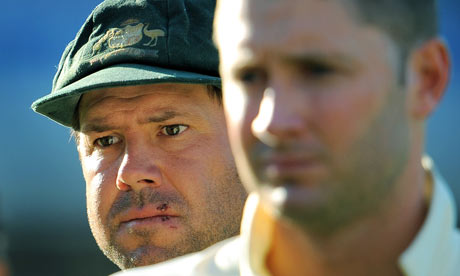'I'm moving to New Zealand' ... what the Australians made of Ashes defeat
As the celebrations began in Kennington, so did the recriminations in Australia, as seen by our man Down Under

The calls for Ricky Ponting's head are growing in Australia, though his deputy Michael Clarke has also been criticised. Photograph: William West/AFP/Getty Images
The dingoes are out. They have crept into the Australian camp and dragged away the carcass of a once-great cricket team, devouring what meat is left on the bones of Ricky Ponting's losers.
"Let the Ashes inquest begin," said the Sydney Daily Telegraph before even that giant flag of St George had been rolled across the Kennington turf on Sunday evening.
Watching from a distance, in Coff's Harbour, the sub-tropical paradise on the northern coast of New South Wales and home of the discarded Phil Hughes, lent the experience a more detached perspective, I'm sure, than the triumphalism engulfing England.
Wherever you watched it, from whatever point of view or couch, the margin of victory hardly reflected the tension. Tellingly, even when wrestling with defeat of alligator-sized proportions, the Australians gave the impression, at least, of being a threat. The buggers are as hard to kill as a redback spider. The feeling would not have been the same had the situations been reversed.
Those of us who spectated on into the small hours detected even through the television ether the familiar English silence that comes from years of crushed hopes when in sight of victory. That palpable sense of deferred celebration until the last soldier had been knocked down was the unspoken praise these noblest of foes deserved.
There is not much nobility evident in the wreckage of defeat, though. The sentiment here is that Ponting will survive for the time being, and lead Australia against the West Indies at home next summer, but his hopes of getting revenge in England after becoming only the second Australian captain to surrender the Ashes twice in England are the stuff of wild ambition.
Brett Lee and Stuart Clark are headed for the fast bowlers' knackers yard and even his grinding century might not save the 34-year-old Mike Hussey after a hesitant campaign. The thirst for fresh talent looks to be insatiable.
The experiment with Shane Watson as opener, even though a success, will be abandoned when he returns to the lower middle order, leaving the way open for the return of young Hughes. Discarding the most exciting batsman to come into their ranks since the other Hughes, Kim, reflected a nervousness among the selectors at odds with our perception of Australian cricket as the home of "step-up-to-the-plate" daring. There were no "back-yourself" clichés to sustain the bluff this time.
Elsewhere, they – or their successors – will look for someone to turn the ball with more mystery and bite than the sound servant Nathan Hauritz.
In all, there could be half a dozen casualties from the tour, an almost English upheaval and one not experienced here outside the passing of legends. Australians, an essentially conservative lot despite their larrikin swagger, do not like enforced change – and they do not cope well with the reality of failure, given they are less accustomed to its regular visits than England.
Only in Australia would an heroic but doomed effort to haul down an improbable target of 545 be described as "a humiliating defeat".
Quite where the humiliation lies in grinding out 348 runs on a wicket that had been derided from days one to five as a doctored minefield is a question the readers of the Sydney Morning Herald and Australia's other newspapers were left to ponder over their late-winter cornflakes as the critics who'd cheered them until the fall got properly stuck in. Coping with officially being the fourth best team in the world after 14 years at the top of the ICC rankings will be tough. We wish them well.
It would be cruel and unjust to simply blame the players, though. The other, perhaps more culpable, villains are Andrew Hilditch and his selectors, whose decision to deny Hauritz a chance to exploit the Oval dustbowl is fast being cooked up into the crime of the century. Their reluctance to recall Clark, then their insistence on keeping him past his usefulness on a turning track, were avoidable blunders.
Nor did just the team management contain internal confusion, as Lee, Clark, Watson and Johnson shamelessly campaigned for selection while contradicting not only each other but the facts.
Hilditch and co will not last long if the chorus call from former Australian heroes, headed by the ever-honest Ian Chappell, are heeded.
Michael Slater, no stranger himself to selectorial whims, observed, "The fact of the matter is that we have gone over to England with the wrong squad. We needed an aggressive off-spinner ... and our best option was Jason Krejza."
That was the pre-tour opinion also of John Benaud, a former chairman of selectors. The general view is that the generals got it wrong.
The blogosphere, of course, was filled with the usual wise-after-the-event half-wittery. You've got to chuckle at the likes of Mike of Sydney: "It was just great to watch Michael Clarke's mammoth contribution in this match ... run out for 0 in the second innings ... what a bloody boxhead." A boxhead who averaged 64 – 12 better than anyone else who played more than one Test in the series – and will one day be hauled up alongside his country's greats.
Then there was Patrick Porter: "Beaten by the Poms in the Rugby World Cup twice, then in the Olympics and now the Ashes. I'm moving to New Zealand."
In London, it was another Kennington roof-top finish; here the 2009 Ashes came to its dramatic conclusion on the TV screens of the disbelieving through-the-night faithful, supporters who dreamed against the odds almost until dawn for one more miracle.
It was a detached way to witness a momentous occasion, eyelids propped up until they surrendered, then reopened over coffee and the bright Monday morning sunshine of a new cricketing age. It didn't half feel good.
This article was first published on guardian.co.uk at 11.06 BST on Monday 24 August 2009. It was last updated at 11.28 BST on Monday 24 August 2009.
- guardian.co.uk © Guardian News and Media Limited 2009


No comments:
Post a Comment